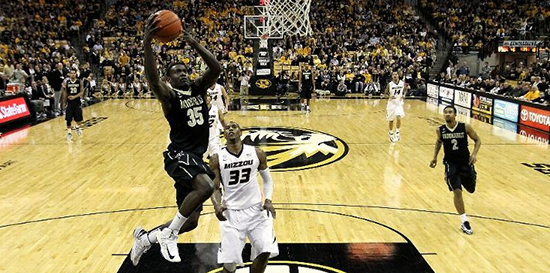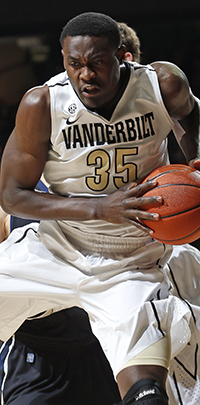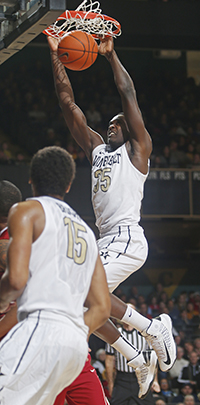Feb. 4, 2013
Subscribe to the Commodore Nation | January issue
by Chris Weinman

It was not the dream of playing major college basketball that brought James Siakam to the United States nearly six years ago. It was simply the dream of attending college and bettering his education that brought Siakam to the sport of basketball.
Growing up in Douala, the largest city in Cameroon, it was the national sport of soccer that captured Siakam’s imagination. But after watching his two older brothers excel on the hardwood and earn scholarships to attend college in America, he knew he would have to forgo his first love in order to improve his future.
“I still think that I’m actually a better soccer player,” he said. “But the opportunities weren’t as big as coming to the U.S. to play basketball, so I had to give it up.”
In a family of six children, James is the third of Tchamo and Victoire Siakam’s four sons. When James was 11 years old, his oldest brother, Boris, moved to the United States for his senior year of high school. Boris attended Caverna High School in Horse Cave, Ky. (about 100 miles north of Nashville), before signing a National Letter of Intent in 2004 to play basketball at Western Kentucky University.
It was still two more years before James started playing basketball, at the age of 14.
“When I decided to play basketball it was kind of late. I saw my brother travel around playing so I thought that would be a great opportunity to actually showcase my talent,” Siakam said. “I could jump, block shots and I was going for offensive rebounds like crazy. That was what was impressive about my game when I first started.”
By this time, James’ other older brother, Christian, also had made his way to America. Christian completed his senior year of high school in Cincinnati, Ohio, and moved on to pursue a degree in international studies while playing basketball at Indiana University-Purdue University Indianapolis (IUPUI).
It was decided that James would follow in his brothers’ footsteps and leave Cameroon in 2007. And while basketball played an important role in getting him to America, Siakam’s No. 1 goal in coming to the U.S. was to better his education.
 “(The decision to come to the United States) was definitely based on the academics,” Siakam said. “My dad thought it was a good opportunity to come to the U.S. and study, and be able to come back home and make an impact. As you probably know, back home Cameroon doesn’t have the greatest economy. He thought maybe studying in the United States would be a great opportunity. He started talking to my brother, who knew a lot of people, and my brother had some friends who were willing to give me an opportunity based on my academics strictly.”
“(The decision to come to the United States) was definitely based on the academics,” Siakam said. “My dad thought it was a good opportunity to come to the U.S. and study, and be able to come back home and make an impact. As you probably know, back home Cameroon doesn’t have the greatest economy. He thought maybe studying in the United States would be a great opportunity. He started talking to my brother, who knew a lot of people, and my brother had some friends who were willing to give me an opportunity based on my academics strictly.”
So James moved from the west coast of Africa to a northwestern suburb of Atlanta, where he enrolled at Marietta’s Covenant Christian Ministries Academy, a boarding school. In his only season in Marietta, the Crusaders’ elite squad won the 2008 NACA (National Association of Christian Athletes) national championship.
That summer, Siakam transferred to Brehm Preparatory School in Carbondale, Illinois. He competed for a traveling AAU team, the Illinois Titans, and began to catch the eye of college recruiters.
“When I looked at college coaches, recruiting-wise, you basically feel like you’re hearing the same person over and over,” Siakam said. “There must be something extra that you’re looking for. They want you to showcase your abilities basketball-wise, but I was most concerned with who will be looking for your best interest as a person. I definitely found it in Vanderbilt.”
His decision was made easier during his final year at Brehm, where he averaged 18 points, 10 rebounds and five blocks per game. In December of 2009 at the State Farm Tournament of Champions, Siakam suffered six fractures when he took a knee to face during a game. Some thought the injury might prevent him from returning to the game. But Siakam says the coach recruiting him to Vanderbilt, former Commodore assistant Dan Muller (currently the head coach at Illinois State University), kept checking in on him despite his unclear future.
“When I had to have facial surgery, all the coaches that were looking at me got scared away,” Siakam said. “They thought I was not going to play anymore. But coach Muller was there. He was checking on me, not even talking about basketball, just checking on me and knowing how I was doing. I thought that was really impressive.”
Siakam committed to the Commodores during the late signing period in April, 2010. Arriving on campus that fall, he again took a cue from one of his brothers by redshirting (Christian sat out during his first year in Indianapolis, and he went on to average 9.0 points per game and 6.4 rebounds per game over his junior and senior seasons at IUPUI).
After appearing in just 13 games a year ago, Siakam has averaged more than 11 minutes per game through the first third of the 2012-13 season. He led the Commodores in points and rebounds against Marist in the Old Spice Classic.
 While the transition to college can be tough on its own, Siakam has endured it all while being away from his family. The entire Siakam family, in fact, has not been together in years. James last saw his father in 2010 when Boris got married in Kentucky. James’ mother has returned once since then, after Boris’ wife Krystal gave birth to their first child. James has not seen his younger brother, Pascal, since coming to the U.S. back in 2007.
While the transition to college can be tough on its own, Siakam has endured it all while being away from his family. The entire Siakam family, in fact, has not been together in years. James last saw his father in 2010 when Boris got married in Kentucky. James’ mother has returned once since then, after Boris’ wife Krystal gave birth to their first child. James has not seen his younger brother, Pascal, since coming to the U.S. back in 2007.
“It’s been pretty tough,” Siakam said. “I want to say I’m used to but I’m really not. Sometimes I just miss my family. But it helps to have my brothers around. They’re both players overseas now, so they’re not here the whole year.”
Boris and Christian play pro basketball in Bahrain’s Premier League. James has two older sisters: Raissa lives in Washington, D.C.; Vanessa in South Africa. Pascal is a student in Texas.
“He came to the United States about a month ago,” James said. “He’s playing basketball. I don’t know much about his playing ability, because when I left he was still playing soccer.”
If his brothers are any indication, Pascal has an excellent opportunity to prosper as a basketball player in America. As for James, even as he is working hard to become a better basketball player, he is excited about the prospect of returning to his homeland to give back. He cites countryman Luc Richard Mbah a Moute, who attended UCLA before being selected by the Milwaukee Bucks in the second round of the 2008 NBA Draft, as the perfect example of how he would like to help out back home.
“He went to the NBA and came back [to Cameroon],” Siakam said. “He’s helping out other kids by directing camps and stuff like that. I think that’s a great thing to do. That’s probably the best example I can think of. I think there’s a great opportunity for me also. If I can create a business back home to give people the opportunity to get jobs. Because we have a lot of people who are willing to work, just not a lot of opportunity as far as work goes.”

